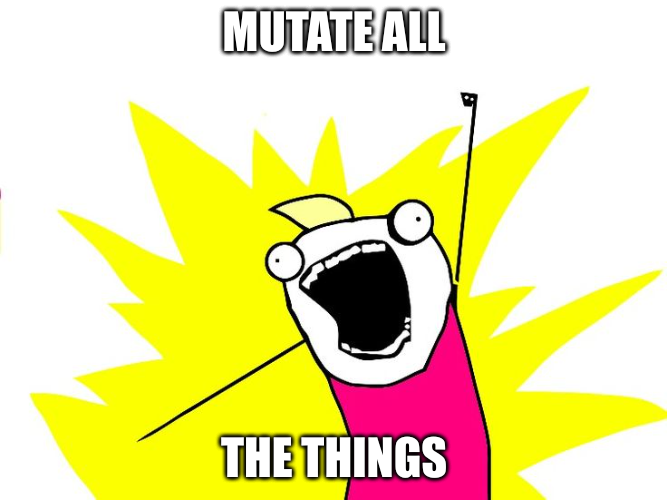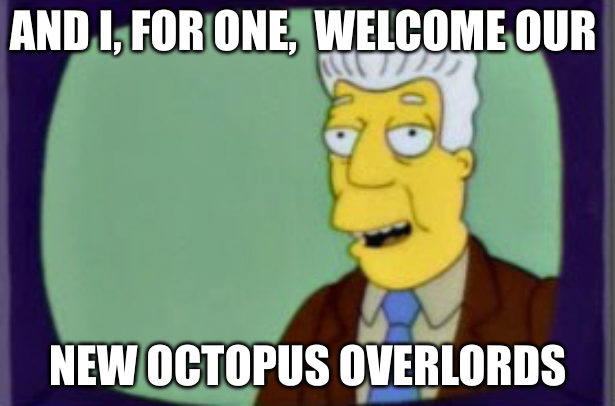Save Humanity! Breed Sapient Octopuses!
post by Yair Halberstadt (yair-halberstadt) · 2022-04-05T18:39:07.478Z · LW · GW · 17 commentsContents
18 comments
One of the problems that make AI alignment so difficult is that we don't have any models for how non-human intelligences will think. This makes it both hard to reason about how an AGI would behave, but also makes it difficult to get people to take the threat of AI seriously.
Ideally we would have a way to create a human level AGI, hold it at that level for a few years so we can understand it deeply, then once we've solved alignment slowly crank it up a bit. Unfortunately, given trends like moors law, that's unlikely to be possible.
So what if we didn't use computers to create an AGI? What if we used animals? Those are harder to scale from human level intelligence to kill all humans level intelligence without someone being a total idiot.
It's the 21st century, so we don't need to use your grandpa's breeding techniques. If we can identify genes that strongly code for intelligence in an animal, we can select for gametes with those genes, and selectively breed them. We can even use crispr to create some gametes with All The Positive Mutationsᵀᴹ.

Done this way it seems possible we will be able to improve intelligence by as much as 5% a generation. Even if animals start off 10 times less intelligence than humans, it would take just 50 generations to reach human level intelligence.
50 years seems like a reasonable estimate till AGI appears on the scene. So all we need is an already intelligent animal with a generation time of less than one 1 year.
Enter the larger Pacific striped octopus!

These intelligent octopuses reach sexual maturity after 6 months. Even better, unlike most octopuses they don't die after mating, so they have a longer lifespan to learn things in - about 2 years.
And given that octopuses evolved intelligence through completely alien pathways to humans, this will give us as close a window into what an artificial intelligence might look like as is possible.
It's clear that our very best option to ensure human survival is to start a breeding program involving hundreds of thousands of larger Pacific striped octopuses and use cutting edge genetic research and ethically dubious techniques to get them to human level intelligence faster than computers. Anyone who says otherwise is clearly on the side of the transistors!
17 comments
Comments sorted by top scores.
comment by sanxiyn · 2022-04-06T13:09:47.671Z · LW(p) · GW(p)
I searched some more. In 2013, scientists selected for brain size on guppies and got 9% larger brain in 2 generations. Guppies with larger brains were smarter. This seems to validate feasibility of breeding program and suggests a simple method to select for intelligence.
comment by AlexMennen · 2022-04-06T00:36:26.610Z · LW(p) · GW(p)
I know this was tagged as humor, but taking it seriously anyway,
I'm skeptical that breeding octopuses for intelligence would yield much in the way of valuable insights for AI safety, since octopuses and humans have so much in common that AGI wouldn't. That said, it's hard to rule out that uplifting another species could reveal some valuable unknown unknowns about general intelligence, so I unironically think this is a good reason to try it.
Another, more likely to pay off, benefit to doing this would be as a testbed for genetically engineering humans for higher intelligence (which also might have benefits for AI safety under long-timelines assumptions). I also think it would just be really cool from a scientific perspective.
Replies from: yair-halberstadt↑ comment by Yair Halberstadt (yair-halberstadt) · 2022-04-06T05:35:56.064Z · LW(p) · GW(p)
I also think it would just be really cool from a scientific perspective.
Definitely would be super cool! That's the main reason I actually want this done.
comment by peterbarnett · 2022-04-06T14:18:51.329Z · LW(p) · GW(p)
Will this happen? Bet here! https://manifold.markets/PeterBarnett/will-someone-recieve-funding-to-inv
comment by Julian Bradshaw · 2022-04-06T00:11:24.579Z · LW(p) · GW(p)
Why not breed for compatibility with human values as well? We could then study the differences between various degrees of "aligned" cephalopods and wild cephalopods.
It might be easier than selecting for intelligence too; humanity has successfully modified dogs, cats, and livestock to provide more positive utility to humans than their wild counterparts, but hasn't drastically increased the intelligence of any wild animal to my knowledge, despite there plausibly being benefits for doing so with ex. horses or dogs.
Breeding for human values also limits some of the downsides of this plan, like the chance of ending up conquered by unaligned octopuses.
Replies from: yair-halberstadt↑ comment by Yair Halberstadt (yair-halberstadt) · 2022-04-06T05:30:05.292Z · LW(p) · GW(p)
Breeding for human values also limits some of the downsides of this plan, like the chance of ending up conquered by unaligned octopuses.

↑ comment by Yair Halberstadt (yair-halberstadt) · 2022-04-06T05:35:05.310Z · LW(p) · GW(p)
Sorry, had to be done!
I think the risk of unaligned octopuses taking over the world is lower than the risk of unaligned AGI:
- We know how to stop breeding octopuses once they reach human intelligence.
- Even once octopuses reach human intelligence it might take a long time for them to learn the technology required to win a war against us.
- They have short life spans, so limited time to learn new technologies or cultural evolution. The idea would be to see how long it took for octopuses to solve the sort of problems uneducated intelligent people could, not invent novel mathematics.
↑ comment by davidestevens · 2022-04-06T12:05:38.332Z · LW(p) · GW(p)
Planet of the Squids!
comment by rank-biserial · 2022-04-05T23:31:02.803Z · LW(p) · GW(p)
Judging by the fox domestication experiment, intelligence could emerge way sooner than 50 generations. The fox experiment used a population size on the order of 1e2, and selected the top 20% most docile foxes to act as the breeding pool for the next generation. You could accelerate this process by increasing the population size, while selecting a smaller fraction of intelligent octopuses.
Replies from: yair-halberstadt↑ comment by Yair Halberstadt (yair-halberstadt) · 2022-04-06T05:27:10.107Z · LW(p) · GW(p)
Docility seems much easier to breed than intelligence, because it's about reducing the foxes ability to do things (act violently), rather than create new capabilities.
I.e. a random mutation has a high chance of increasing docility, but a very low chance of increasing intelligence.
Replies from: rank-biserial↑ comment by rank-biserial · 2022-04-06T05:35:47.347Z · LW(p) · GW(p)
Within humans, intelligence-related genes behave additively. That is, the predicted IQ of a child of a 95 IQ mother and a 115 IQ father follows a normal distribution centered at 105. Since "general intelligence" exists to some degree in octopuses, we're amplifying an existing trait, rather than creating one de novo. If intelligence-related genes behave additively in octopuses as well (and we should assume that they do), then breeding octopi for intelligence should be as straightforward as breeding cows for milk.
Replies from: yair-halberstadt↑ comment by Yair Halberstadt (yair-halberstadt) · 2022-04-06T06:26:57.933Z · LW(p) · GW(p)
I would agree for small increases in intelligence, but what happens when we use up all the available genes for intelligence that already exist in octopuses, and need to wait for new ones to mutate?
Replies from: rank-biserial↑ comment by rank-biserial · 2022-04-06T06:51:30.770Z · LW(p) · GW(p)
Epistemic status: Shaky
That's not how it works. People bred chihuahuas from wolves, and the blue whale evolved from a goat-sized land mammal. If the additive genes that control spinal length just upregulate some pre-existing developmental process, it's not too much of a leap to assume that the additive genes that control intelligence just turn up a similar developmental knob. That would imply that intelligence-increasing mutations are common (being less complex), and that intelligence could be selected for like any other trait.
Replies from: yair-halberstadt↑ comment by Yair Halberstadt (yair-halberstadt) · 2022-04-06T09:01:11.853Z · LW(p) · GW(p)
How many generations did it take for both? I would estimate about 2000 for dogs, and many more for whales. That's plenty of time for new mutations to occur.
comment by sanxiyn · 2022-04-05T20:37:56.479Z · LW(p) · GW(p)
Sounds like a good idea!
Why this specific species? Introducing a new model organism is a large investment. After a brief search, I actually found a proposal to introduce octopus as a new model organism, but choosing a different species.
The Lesser Pacific Striped Octopus, Octopus chierchiae: An Emerging Laboratory Model (2021)
Some choice quotes:
Despite the immense potential for comparative biological research between octopuses and vertebrates and aquaculture advances from the husbandry of other cephalopod species, a sustainable, multigenerational laboratory octopus model has yet to be attained. [cites researches starting from 1977] (snip) Here, we overcome these challenges by advancing the laboratory aquaculture of the lesser Pacific striped octopus, Octopus chierchiae.
So the necessary basic work is now done. Maybe culturing other octopus is now easier based on this success, but I won't bet on it, given that it failed for >40 years. On the other hand, I must admit it doesn't seem much effort was spent on this problem in those 40 years.
Replies from: Julian Bradshaw↑ comment by Julian Bradshaw · 2022-04-05T23:23:18.372Z · LW(p) · GW(p)
Re: level of effort, some brief googling tells me that there has been some interest in breeding octopuses for food, but it's been quite difficult, particularly handling the larvae. BBC claims the current state-of-the-art is a promise that farmed octopus will be on the market in 2023.
Update 2024: that octopus farm still isn't operational due to widespread opposition, but it's not canceled yet either.
comment by mukashi (adrian-arellano-davin) · 2022-05-08T19:18:18.109Z · LW(p) · GW(p)
Didn't learn this until recently but it seems that the plural of octopus is octopi